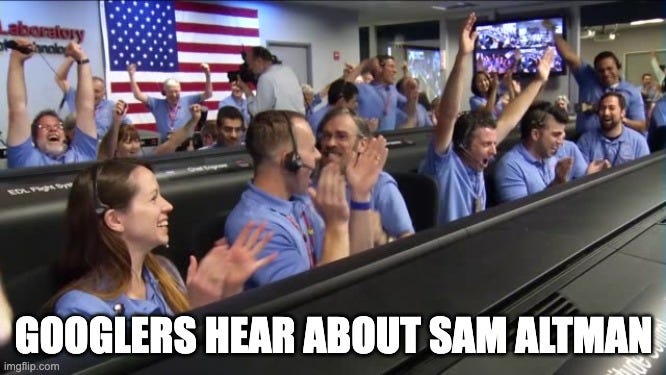Generative AI Job Loss is Real
For Sam Altman!
The big news of 17th November was the sudden ousting of Sam Altman as CEO of OpenAI. This was a surprise for a few reasons:
OpenAI is wildly successful, reported valued at $80 billion. Altman was very much the face of the company - meeting with European heads of state, testifying in Congress, and delivering the DevDay keynote less than 2 weeks ago with no sign of the impeding storm.
The investors only found out minutes before the rest of us. Even Microsoft, with their massive investment, were blindsided and their shares dropped 1.6% on the news. Satya Nadella issued a statement on the Microsoft Blog which sounded like he still didn’t know, just expressing general support for the partnership and looking forward to the future. I guess the idea was to get out there and say something while also saying nothing.
The language in the OpenAI official statement, specifically:
Mr. Altman’s departure follows a deliberative review process by the board, which concluded that he was not consistently candid in his communications with the board, hindering its ability to exercise its responsibilities. The board no longer has confidence in his ability to continue leading OpenAI.
Make no mistake, in startup/corporate America, this is brutal
The Chairman of the Board, Greg Brockman, was also fired (or quit, depending on which story you read). This is less of a surprise, as one part of the chairman’s role is to protect the investors and hold the executives to account. If the CEO’s behaviour is deemed unacceptable, questions will be asked about the chairman’s handling of the situation, as Sir Howard Davies found out during the Natwest/Farage episode (although he survived).
After an evening rife with speculation, most opinions landed on a split between the Altman faction wanting commercialisation and the Ilya Sutskever (Chief Scientist) faction favouring a focus on safety. Why the sudden action with no consultation with investors though? There’s a body of opinion that this is because the board is inexperienced (and, to be fair, was originally formed to govern a non-profit focused on research) :
So what does this mean for OpenAI? Right now they are ahead of everyone else, but what happens when Altman founds another startup and the money follows him, because VCs tend to be more interested in commercialisation than anything? No doubt they’ll still do great research, but the end game for that feels more like acquisition than world domination. Probably good news for startups in this space (especially whichever one Altman founds), as it did seem like OpenAI were moving into the spaces that some of them occupied.
As always, I like to try to look at these things also through a Salesforce lens, and I think this is both a good and a bad thing for them. Good, in that OpenAI appear to want to focus on safety and the responsible use of AI, which marries up nicely with Salesforce’s “Your data is not our product” mantra. Bad, because as far as I’m aware OpenAI is their one Generative AI product partner and it’s looking decidedly unstable right now.
I’d imagine that Salesforce will be looking to accelerate their partnerships with other Generative AI providers, as their current one is looking at (a) some turmoil and (b) slowing down. A bus number of 1 is never good, whether it’s teams or suppliers.
Final Thoughts
It’s been great to be in the industry when the major strides have been made in Generative AI, and now it’s there’s a big chunk of drama for us all to enjoy.
For all the talk of the demise of X/Twitter, it’s been the go to place for the skinny, mostly from Kara Swisher:
This is a great time for any tech company to announce bad news - literally nobody will be listening.
Are the OpenAI board wise to upset the man who is telling us how bad AI could get? In 20 years will there be an AI Inigo Montoya taking them all out?




